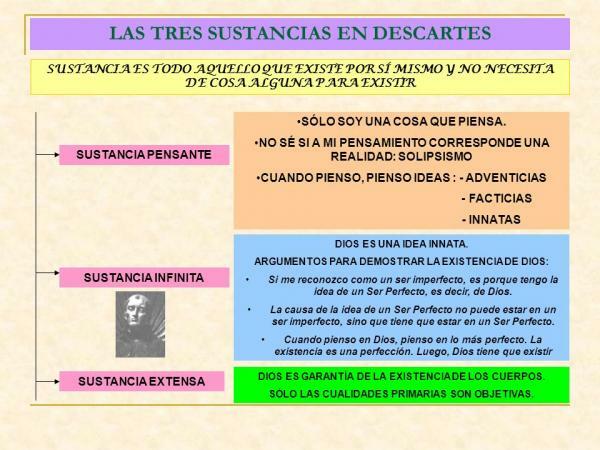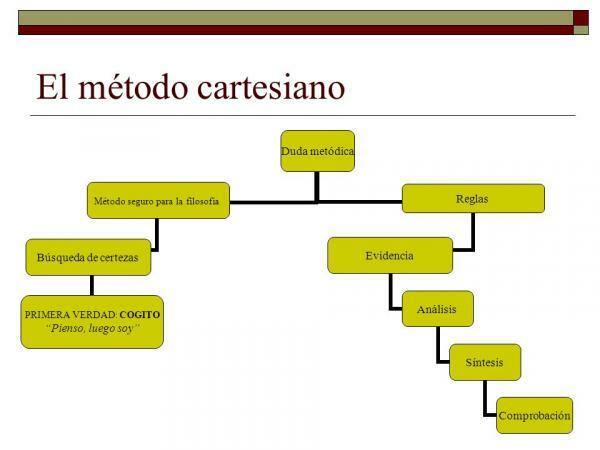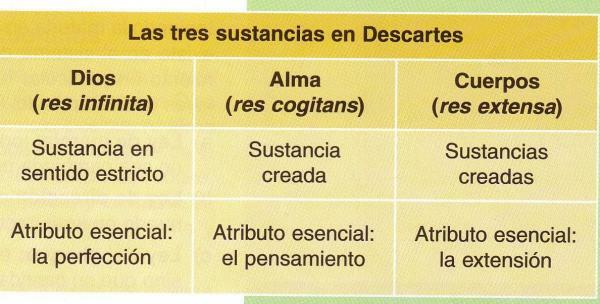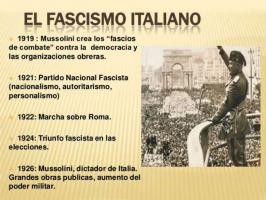The concept of substance in Descartes

Image: Slideplayer
Let's do clean sheet. Suppose our mind is blank, empty of ideas and convictions. Let us doubt, for a moment, everything we believe and begin to ask ourselves, what is reality? Is there an external world independent of our senses, or on the contrary, is it conditioned by them? Can we distinguish wakefulness from sleep? Are we immersed in the Matrix?there is a thinking and corporeal being living in a real world? Descartes, part of the doubt as a method to know the truth, and the application of it, leads him to affirm the existence of 3 substances. In this lesson from a TEACHER, we will explain what is the concept of substance in Descartes And, for this, we will tell you what the theory of the 3 substances of Descartes consists of. It is the beginning of modern philosophy.
To know what is the concept of substance in Descartes we have to know that uncertainty is the starting point of Rene Descartes, father of modern philosophy. Part of the doubt as an instrument to reach the truth. But what is truly revolutionary is that, for the first time,
the subject is the starting point of knowledge, opening the way to modern philosophy.Doubt, then, is his method of finding an idea, so clear and distinct that there is no doubt about the evidence of it. The philosopher intends to build a valid philosophical system, starting from the mathematical model, the only one in which he finds satisfaction due to the certainty and evidence of his reasoning. There is only one method to reach the truth and this is the scientific method (Concept of Mathesis Universalis, Rule I, The Discourse of the Method).
Doubt is universal, methodical, theoretical, hyperbolic, and exaggerated. And so he doubts the senses and even mathematics, but what he cannot doubt is the perfection and truth of God, the only guarantee of the truth, since it is impossible that such a kind being can deceive us (In this way, he eliminates the hypothesis of the evil genius =Matrix)
Descartes is a rationalist who claims the validity of reason as the only source of knowledge and the existence of ideas innate in the individual. But at the same time, he wonders why reason, being such a valuable and effective tool, leads so many times to error. The problem, without a doubt, is the lack of a method.

Image: Slideplayer
To know the concept of substance in Descartes we have to know that the method leads Descartes to find the first absolute certainty, that is, the existence of the subject that he thinks, which is summarized in the sentence "Cogito ergo sum". The I think it is a clear and distinct truth, immediate, intuitive. The first evidence that we cannot doubt because, the very fact of doubting, is the evidence of the existence of a thinking subject.
Thus, he affirms the existence of 3 substances. The philosopher calls substance to everything that does not need any other reality to exist. In this sense, only God or “res infinita ”could be a substance, however, he admits that there are two other substances that make up the totality of what is real: the "res cogitans" and the "res Amplia", and they are independent each.
1. The Res cogitans: the thinking self
Thought or consciousness, as a set of thoughts, ideas and representations that exist in the me it is subjectivity and at the same time the strongest reality, being the only thing that surpassed doubt. The me who doubts, what he thinks, what he feels, who has ideas ...
"I then carefully examined what I was, and seeing that I could pretend that I had no body and that there was no world or place in that I found myself, but that I could not pretend that I was not, (...) because of this I knew that I was a substance whose essence or nature all is thinking, and it does not need, to be, from any place, nor does it depend on any material thing; so that this I, that is, the soul by which I am what I am, is entirely different from the body and even easier to know than this and, even if the body were not, the soul would not cease to be how much is it."
But this does not guarantee the existence beyond the subject.
2. The infinite res or divine substance: God
After an analysis of the thinking substance, Descartes reaches the conclusion that the idea of perfection, although it is an intuition, is not an quality of the same and, therefore, there must be a being, that in fact, does possess it, that is, God, who is discovered as an innate idea of the cogito. This is the guarantee that there is a reality beyond the subject, and therefore, it is a guarantee of the truth.
"It is also (the idea) completely clear and defined, since everything that I perceive clearly and definitely that is real and true and that it contains some perfection, is contained in its entirety in this idea."
3. The extensive res: the world
The world has to exist because such a perfect God would not allow the thinking being to live in such deception. The world has been created by God, a finite, imperfect substance, made up of animals (human and non-human), plants and minerals. He is the creator of the great machine that is the world, the cause of the first movement, and of inertia. From here Cartesian physics is built.

Image: philosophy for the good life

